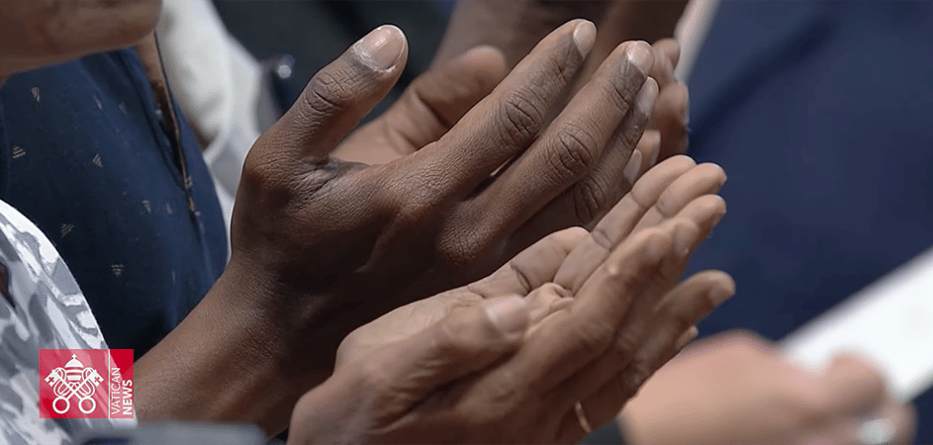The Convocation of Catholic Leaders, a large national gathering of diverse leaders from across the Catholic Church in the United States, is taking place July 1-4 in Orlando. Having followed the convocation from its inception and planning, I can attest to the intention of opening a window to let in some new air.
The idea is to hang a freshly-painted welcome sign on the Church, prominently placed over a door that once seemed forbidding. It’s also to deploy communication devices that can pick up the channel of today’s people, and allow for two-way exchanges.
The focus is on the lay people of the dioceses, going beyond just the “usual suspects” to invite new voices and emerging leaders. The content is impressively comprehensive, with 66 breakout sessions on topics ranging from the expected (social justice, immigration, parish vitality, faith formation) to the uncomfortable (the “nones,” reaching out to those hurt by leaders and members of the Church, ministry to people with same-sex attraction).
The sessions themselves are not showcases for the speakers, but instead the bulk of time is reserved for audience participation. Adopting the framework of “see, judge, act,” the convocation solicits reality checks following Pope Francis’s frequent urgings that the Church must meet people where their lives are, provide an opening for dialogue, and cultivate the imagination for new opportunities and new thinking, while ending with a call for action and commitment.
We owe a debt to the United States Conference of Catholic Bishops staff for their vision and architecture for this convocation, and for their extensive logistical preparation and coordinating efforts. For the Church leaders who see the need for such a convocation and play Godparents to it, thank you. Your desire for engagement with the laity has produced this hope- and grace-filled invitation.
In preparation for this gathering, I call to mind the voices and anguish of a few people.
One is a good friend, a woman in her seventies who converted to Catholicism fifty years ago when she married a Catholic man of deep faith. My friend became deeply invested: was constant in worship and participation in the sacraments, prolific in reading to deepen her understanding of the Gospel; did more than her part to support parish ministries and parish life. The sexual abuse crises caused her to question the priority of clerical hierarchy to protect its own rather than those entrusted to them. These were compounded by dismissiveness from church leaders when she and other women asked for solutions and accountability.
Her disappointment is not focused on the issue of women’s ordination, but more with the brushing away of women’s voices, cold shoulders to women’s desire to participate in decision-making, and the utilization of women’s labor but not their thoughts or voices.
The investigation of the congregations of religious women in the U.S. put her over the top. She could no longer find the alignment between the Gospel message and her experience of the institutional Church. She stopped attending Mass, and resorted to self-study of the Gospel with a group of like-minded Catholic women.
Second is a young man in his late twenties, well-schooled in the study of theology with a Bachelor and Masters in the field. He is re-thinking his vocation as a faculty member in Catholic high schools. He is aware that some of his students are gay, or wrestling with their sexual identity. When he covered marriage as part of the curriculum, he was encouraged to find that if he rendered the teachings of the Church in a clear manner without ostracizing the students who might be gay, some would say, “OK, I do not know whether I agree with the Church, I have to think about it, but I can understand where the Church is coming from.”
But for those students who needed more, who needed to know where the Church would meet them and whether they are loved for who they are, this young man felt that there was very little space in the Church for him as a theology teacher to pursue that conversation, in essence to follow up with a pastoral response. He felt that his students deserved more than just an articulation of Church teaching.
Pope Francis and this convocation both speak of “accompaniment,” but what does that look like?
The third person who comes to mind is a colleague in a Catholic institution who supported a non-profit organization devoted to protecting all people against violence, including gay people. But he was advised that any efforts that support gay people, including this anti-violence initiative, can be scandalous to the Church, equivalent to calling something evil good. He was advised, minimally, not to list his support in social media as it might draw censure that could jeopardize his employment.
He had to reconcile the Gospel message of God’s love for all with this exclusion. He, and many like him, could not.
Often, when we talk about the people who have left the Church or the young people who do not go, we assume that they do not know the Gospel, are shallow in their faith, or have fallen prey to secular culture. But these are examples of people who take their faith very seriously. They internalize the good news of the Gospel which is the love of God for all, His search for the lost, and His mercy above all.
Their departure stems from anguish, deep disappointment, and often times a heart-breaking recognition that they could not find Jesus in the institutional setting and the people who propose to help them get to God.
I hope the convocation evokes a humility that allows the Church to recognize how we may have fallen short, to express our sense of loss for these individuals, to welcome them back with their faith and experiences, however difficult these are for us to hear. We have to trust that their critiques are not to divide or diminish the Church. They are gifts to us in our journey to become a more loving and authentic faith community.
Let us hold firm in the wisdom that the Holy Spirit sometimes sends us teachers from unlikely places speaking uncomfortable words. Let us tune in, as if to doctors who tell us what we need to do differently for our own good.
As chief administrator of two complex Catholic organizations, the business school at Notre Dame and Catholic Relief Services, I would never postulate administration and ministry as opposing goods, reasons being that the word “administration” encompasses the concept of ministry, and in practicality, effective ministry is enabled by good administration. Yet they can be competing demands, pulling and tugging, addressing needs and dealing with tensions which call for different responses and behaviors.
I learned much about this during the last month of my tenure at Catholic Relief Services when I opened up my schedule to anyone who wished to have lunch. Succession had taken place in a very smooth manner, and the next CEO had been named. The conversation could cover any topic, as long as we protected confidence in personnel matters.
People opened up to tell me about their personal lives. One woman spoke of raising two nieces, and the joy of seeing them come into their own. One colleague spoke of the life he and his wife had shared and built together, and how she prepared him for her passing due to cancer. Another spoke of how she and her husband lived apart during the week due to work requirements, similar to what my husband and I coped with.
Some asked me the hardest decisions or trade-offs I had to make at work. Others confided what was difficult for them, and others in dealing with different changes. A few volunteered how their faith is affected by their work, interactions with people of different faith, inspiring colleagues, and how we could be more of a community. Often, people shared hopes for CRS and how our young colleagues could be empowered and brought into the fold.
These conversations have caused me to think about the constraining forces, if we let them constrain us, of administrative roles, and how they can disable the essential pastoral purpose of ministries. There is a tyranny to administration in terms of its command on our time and urgency on our attention.
I often wonder how I would have found time for such interactions earlier. The truth is that if I had appreciated their significance, they would have been my priority. I wonder how we are church if shepherds do not know their flock; if pastors do not know their parishioners; if the joys that fill people and the burdens that weigh them down are not anyone’s business; or, if, when they take the risk to express their needs and hurts, they are labelled “dissidents.”
I therefore draw much inspiration from the examples of various dioceses where bishops have convened parishioners in earnest listening, personal responses and explicit follow-up.
A professional hazard to administrative roles is that they are based on power, which at best limits expression and, at worst, closes conversations without full and respectful engagement. “Engagement” can increasingly become talking to oneself in an echo chamber of agreements. The power of hierarchy is real, and, if shared, can lead to collaboration and ownership of the mission by others.
This convocation has issued an invitation for lay involvement and missionary discipleship. Two things now have to happen: the invited must step up, and Church leadership must open up the space — not only for action, but for shared leadership in appropriate ways.
Administration aims to preserve orderliness through processes and rules. Administrators dread questions, and sometimes prematurely equate the call for discussion with rebellion. As an example, while many Catholic women actually do not dispute the Church’s stand on women’s ordination, it is safe to say that most of them do not understand the rationale. They often stop asking, fearful that a “why?” question will be perceived as adversarial, rather than the desire to know, to understand, to be able to speak to others about it.
It’s no wonder that the next generation of women makes the leap to thinking there’s just “no room” for women in the Church. Did we give up the opportunity to explore and develop the alternatives for women because we just want to dodge a difficult conversation?
In all this, the Holy Spirit animates us in the achievement of communion inherent to true discipleship. This convocation brims with the hope that we, in missionary discipleship, are capable of both, and that we know what is at stake for making God real in the world.
Carolyn Woo is CEO and President (Emeritus), Catholic Relief Services.














